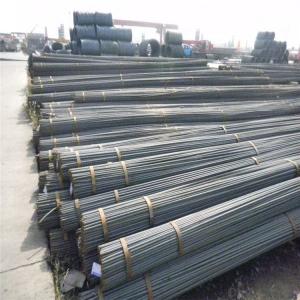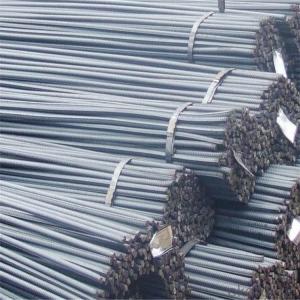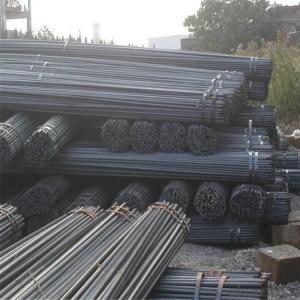Deformed Steel Bars Specification
- Loading Port:
- Tianjin
- Payment Terms:
- TT OR LC
- Min Order Qty:
- 170 m.t.
- Supply Capability:
- 50000 m.t./month
OKorder Service Pledge
OKorder Financial Service
You Might Also Like
Item specifice
Deformed Steel Bars Specification
Description of Deformed Steel Bars Specification
1, Diameter: 5.5mm-10mm Deformed Steel Bars Specification
10m- 40mm Deformed Steel Bars Specification
2, Length: 6m, 9m, 12m or customized
3, Standard: GB, ASTM, AISI, SAE, DIN, JIS, EN
OEM technology - send detailed technical parameters for accurate quotation.
2, Produce Process: smelt iron - EAF smelt billet - ESR smelt billet -
hot rolled or forged to get the steel round bar and plate
3, Heat Treatment: annealing, normalizing, tempering, quenching
4, Surface Treatment: Black
5, Quality Assurance: We accept third party inspection for all orders.
You can ask testing organizations such as SGS, BV, etc. to test our products before shipping.
Chemical Composition of Deformed Steel Bars Specification
Grade | Technical data of the original chemical composition(%) | |||||
Reinforcing steel bar HRB335 | C | Mn | Si | S | P | B |
≤0.25 | ≤1.60 | ≤0.80 | ≤0.045 | ≤0.045 | >0.0008 | |
Physics Capability | ||||||
Yield Strength(N/cm2) | Tensile Strength(N/cm2) | Elongation(%) | ||||
≥ 335 | ≥490 | ≥16 | ||||
Reinforcing steel bar HRB400 | C | Mn | Si | S | P | B |
≤0.25 | ≤0.16 | ≤0.80 | ≤0.045 | ≤0.045 | 0.04-0.12 | |
Physics Capability | ||||||
Yield Strength(N/cm2) | Tensile Strength(N/cm2) | Elongation(%) | ||||
≥ 400 | ≥ 570 | ≥ 14 | ||||
Products Show of Deformed Steel Bars Specification
Company Information
CNBM International Corporation is the most important trading platform of CNBM group.
Whith its advantages, CNBM International are mainly concentrate on Cement, Glass, Iron and Steel, Ceramics industries and devotes herself for supplying high qulity series of refractories as well as technical consultancies and logistics solutions.


F A Q
1, Your advantages?
professional products inquiry, products knowledge train (for agents), smooth goods delivery, excellent customer solution proposale
2, Test & Certificate?
SGS test is available, customer inspection before shipping is welcome, third party inspection is no problem
3, Factory or Trading Company?
CNBM is a trading company but we have so many protocol factories and CNBM works as a trading department of these factories. Also CNBM is the holding company of many factories.
4, Payment Terms?
30% TT as deposit and 70% before delivery.
Irrevocable L/C at sight.
5, Trading Terms?
EXW, FOB, CIF, FFR, CNF
6, After-sale Service?
CNBM provides the services and support you need for every step of our cooperation. We're the business partner you can trust.
For any problem, please kindly contact us at any your convenient time.
We'll reply you in our first priority within 24 hours.
- Q:Can special steel be used in the jewelry industry?
- Yes, special steel can be used in the jewelry industry. It is commonly used to make durable and versatile jewelry pieces, especially in the production of contemporary and industrial style jewelry. Special steel offers unique design options and can be combined with other materials to create stunning and long-lasting jewelry pieces.
- Q:What are the different surface treatments used for special steel?
- There are several surface treatments commonly used for special steel, including galvanization, nitriding, carburizing, and plating. Galvanization involves applying a protective zinc coating to prevent corrosion. Nitriding is a heat treatment process that enriches the surface of the steel with nitrogen, enhancing hardness and wear resistance. Carburizing involves introducing carbon into the steel's surface, creating a hardened layer. Plating, on the other hand, involves covering the steel with a thin layer of another metal, such as chrome or nickel, for improved aesthetics and corrosion resistance.
- Q:What are the factors to consider when selecting special steel for a specific application?
- When choosing special steel for a particular use, there are several critical factors to take into account: 1. Mechanical properties play a crucial role in determining the steel's suitability for the application. Strength, hardness, toughness, and ductility are all important considerations. Matching the steel's mechanical properties to the specific requirements of the application is essential to achieve optimal performance and ensure safety. 2. The steel's resistance to corrosion is another key factor to consider. Different environments, such as marine, chemical, or high-temperature conditions, may necessitate the use of corrosion-resistant alloys or coatings. This is vital to ensure the steel's longevity and reliability in service. 3. Temperature resistance is crucial in many applications. The steel must be able to withstand high or low temperatures without compromising its mechanical properties. Factors like thermal expansion, thermal conductivity, and resistance to thermal fatigue should be taken into account to ensure effective performance in the intended environment. 4. If welding or fabricating the steel into complex shapes is necessary, the ease of weldability and fabricability becomes an important consideration. Certain steels may require specialized welding techniques or preheating to prevent cracking or distortion during fabrication. 5. Cost is a significant consideration as well. It is important to find a balance between the desired properties of the steel and the available budget. This ensures cost-effectiveness without compromising performance or safety. 6. The availability of the chosen steel grade in the required form, size, and quantity is another critical factor. It is crucial to ensure that the selected steel can be easily sourced and obtained within the required timeframe. This helps to avoid project delays or cost overruns. 7. Compliance with industry-specific standards, specifications, or regulations is essential. Depending on the industry or application, there may be specific requirements that the steel must meet. Selecting a steel grade that complies with these standards is necessary to ensure compliance and maintain necessary certifications or approvals. By considering these factors, engineers and manufacturers can make well-informed decisions when choosing special steel for specific applications. This ensures optimal performance, durability, and safety.
- Q:How does special steel contribute to energy efficiency?
- Special steel contributes to energy efficiency in several ways. Firstly, special steel alloys are often used in the manufacturing of energy-efficient appliances, such as refrigerators and air conditioners. These steel alloys have enhanced heat transfer properties, allowing for more efficient cooling and heating processes, thereby reducing energy consumption. Secondly, special steel is commonly used in the construction of energy-efficient buildings and infrastructure. Its high strength and durability enable the creation of lightweight and sustainable structures, which require less energy for heating, cooling, and maintenance. Moreover, special steel plays a crucial role in renewable energy technology. It is used in the production of wind turbines, solar panels, and hydroelectric power plants, enhancing their efficiency and overall performance. The unique properties of special steel, such as corrosion resistance and high tensile strength, make it ideal for withstanding harsh environmental conditions and maximizing energy generation. In summary, special steel contributes to energy efficiency by enabling the development of energy-efficient appliances, constructing sustainable buildings, and optimizing renewable energy technologies. Its utilization in various industries helps reduce energy consumption and promote a more sustainable future.
- Q:What are the different surface finishing techniques used for special steel?
- There are several surface finishing techniques used for special steel, including electroplating, passivation, pickling, and powder coating. Electroplating involves depositing a thin layer of metal onto the steel surface to enhance its appearance and provide corrosion resistance. Passivation is a chemical process that removes surface contaminants and forms a protective oxide layer on the steel, preventing corrosion. Pickling involves using acid solutions to remove surface impurities and oxide layers, resulting in a clean and smooth surface. Powder coating is a technique where a dry powder is applied electrostatically to the steel surface and then cured under heat, creating a durable and decorative coating.
- Q:Can special steel be used in the medical field?
- Yes, the medical field utilizes special steel. Special steel alloys, including but not limited to stainless steel, find extensive application in medical and surgical instruments, implants, and equipment. Stainless steel is selected for its remarkable resistance to corrosion, exceptional strength, and enduring durability. It is commonly employed in surgical instruments like scalpels, forceps, and needles, as well as in orthopedic implants like bone screws and plates. Moreover, special steel alloys are employed in the fabrication of medical equipment such as MRI machines and X-ray tables, where high strength and magnetic properties are imperative. In summary, special steel plays a pivotal role in the medical field owing to its distinctive characteristics and capacity to meet stringent criteria for hygiene, safety, and dependability.
- Q:Can special steel be used in the manufacturing of precision instruments?
- Indeed, precision instruments can benefit from the utilization of special steel. Special steel encompasses a range of steel types that have been purposefully crafted and processed to possess specific attributes, such as heightened strength, hardness, resistance to corrosion, and thermal stability. These unique qualities render special steel highly suitable for applications necessitating precision and accuracy, such as precision instrument manufacturing. Precision instruments, such as surgical tools, measuring devices, optical instruments, and scientific equipment, necessitate materials capable of retaining dimensional stability and enduring extreme conditions. Special steels, such as stainless steel, tool steel, and high-speed steel, provide exceptional mechanical properties, including remarkable tensile strength, resistance to wear, and dimensional stability. Consequently, these kinds of steel are well-suited for the production of precision instruments. Moreover, special steel can be engineered to possess specific characteristics, such as low magnetic permeability or excellent resistance to temperature fluctuations. These attributes prove particularly vital in precision instruments, as magnetic interference or temperature variations have the potential to impact their performance. To summarize, special steel can indeed be employed in the manufacturing of precision instruments due to its exceptional mechanical properties, dimensional stability, and ability to withstand harsh conditions. Its versatility enables the production of precision instruments of superior quality, fulfilling the stringent requirements of various industries, including the medical, scientific, and engineering sectors.
- Q:How does special steel contribute to reducing maintenance costs?
- Special steel contributes to reducing maintenance costs by offering enhanced durability, corrosion resistance, and wear resistance properties. This means that components made from special steel have a longer lifespan and require less frequent maintenance or replacement. Additionally, special steel can be designed to withstand extreme conditions, reducing the risk of failures and breakdowns, ultimately leading to lower maintenance costs.
- Q:What are the factors that affect the corrosion resistance of special steel?
- The factors that affect the corrosion resistance of special steel include the composition of the steel, the presence of alloying elements such as chromium and nickel, the surface finish and cleanliness, the presence of protective coatings or films, the pH and temperature of the environment, and the exposure time to corrosive agents. Additionally, the presence of impurities, such as sulfur and oxygen, can also impact the corrosion resistance of special steel.
- Q:Can special steel be used in the plumbing industry?
- Yes, special steel can be used in the plumbing industry. Special steel, such as stainless steel or alloy steel, offers excellent corrosion resistance and durability, making it suitable for various plumbing applications. It is commonly used in pipes, fittings, valves, and other components that require resistance to chemicals, high pressure, and extreme temperatures.
1. Manufacturer Overview |
|
|---|---|
| Location | |
| Year Established | |
| Annual Output Value | |
| Main Markets | |
| Company Certifications | |
2. Manufacturer Certificates |
|
|---|---|
| a) Certification Name | |
| Range | |
| Reference | |
| Validity Period | |
3. Manufacturer Capability |
|
|---|---|
| a)Trade Capacity | |
| Nearest Port | |
| Export Percentage | |
| No.of Employees in Trade Department | |
| Language Spoken: | |
| b)Factory Information | |
| Factory Size: | |
| No. of Production Lines | |
| Contract Manufacturing | |
| Product Price Range | |
Send your message to us
Deformed Steel Bars Specification
- Loading Port:
- Tianjin
- Payment Terms:
- TT OR LC
- Min Order Qty:
- 170 m.t.
- Supply Capability:
- 50000 m.t./month
OKorder Service Pledge
OKorder Financial Service
Similar products
New products
Hot products
Hot Searches
Related keywords

































